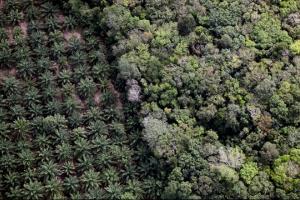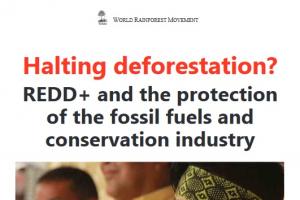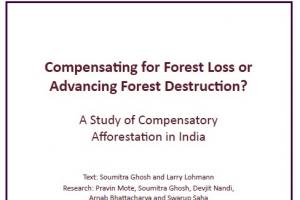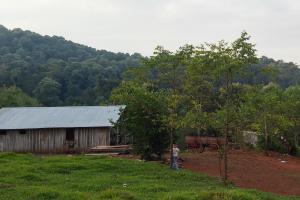The industrial production of natural rubber has always been synonymous with destruction and exploitation. About 70% is used to manufacture tires. As the use of cars, trucks and airplanes increases, the use of rubber will also increase. And this does not come without controversy.
The Green Economy
The Green Economy is a tactic used to “clean up” the image of corporations rather than address corporate capture and capitalism as the true drivers of deforestation. False solutions promoted under the Green Economy include certification, sustainable forest management, ecosystem services, REDD+, the bioeconomy, nature-based climate solutions, and zero net deforestation. Rather than stopping it, these “solutions” support corporate-driven destruction that is causing a deep social and ecological crisis.
Other information
30 September 2019
RSPO is the most widely used voluntary certification system for palm oil companies and it hold its 3rd African Sustainable Palm Oil Conference in Accra, Ghana on August 2019. But Friends of the Earth Africa groups exposed it as a greenwashing label. Cases of environmental degradation and rights violations remain visible in many of the plantations that have the label. They also blame the activities of oil palm plantation companies for biodiversity loss, increased poverty, human rights violations and the climate disaster in Africa, among others.
Other information
30 September 2019
This report -by Anne Petermann and Orin Langelle, Global Justice Ecology Project- examines events and research publicized between 23 June and 4 July 2019 that discuss the mass-use of trees to enable the unsustainable lifestyles of the world’s top 1% in the face of looming ecological catastrophe: from trees genetically engineered to feed the “green” manufacture of energy, plastics and chemicals; the planting of trillions of trees to reduce global atmospheric carbon levels; and “reforms” to the economic system to allow future profit-making under the guise of biodiversity pr
Publications
16 September 2019
2019 | Halting Deforestation? REDD+ and the Protection of the Fossil Fuels and Conservation Industry
This September 2019, the California Air Resources Board (CARB) will make another attempt at pushing through the California Tropical Forest Standard.
Publications
2 September 2019
This study looks at how Compensatory Afforestation is accelerating both, the destruction of forests in India by big corporations and the appropriation of community land for the supposed compensation.
Other information
17 May 2019
Oil giants Eni and Shell have both recently announced plans to use trees to offset some of their ever increasing carbon emissions. On May 13th, NGOs put out a statement opposing the oil industry’s attempts to avoid its responsibility for climate breakdown.
Other information
15 May 2019
Chiefs and leaders of indigenous peoples in Acre published a letter addressed to the governments of Germany and California, reporting that millionaire funds are coming to the state of Acre for REDD and PES payments, without transparency and benefiting few indigenous people.
Bulletin articles
14 May 2019
While the destruction of forest territories continues, more pledges, agreements and programs are being implemented in the name of ‘addressing deforestation and climate change’.
Bulletin articles
14 May 2019
Blue Carbon (or Blue REDD+) appeared as a new carbon offset scheme between emissions and carbon absorption in coastal territories. However, organizations in Indonesia warn that the initiative is a strategy to change the coastal and marine territories into tradable assets .
Bulletin articles
14 May 2019
BIOFUND, a conservation fund to finance protected areas in Mozambique—with support from the World Bank, international cooperation and conservation NGOs—intends to use biodiversity offsets to obtain resources and speculate in financial markets.
Bulletin articles
14 May 2019
Despite the government of Brazil announcing cutbacks to action against deforestation, the Green Climate Fund awarded US$ 96 million for alleged emission reductions in the Brazilian Amazon. These avoided emissions in part exist only on paper.
Bulletin articles
14 May 2019
A long cycle of state repression in India now sees new amendments to the colonial Indian Forest Act which would not only make forest bureaucracy more powerful than ever, but would also de facto put an end to the landmark Forest Rights Act.











